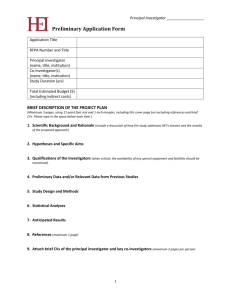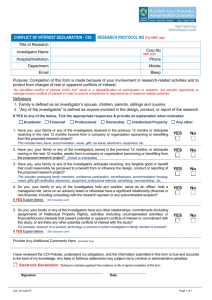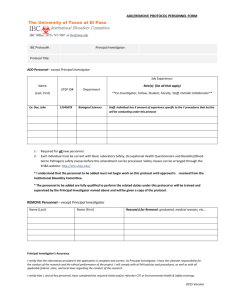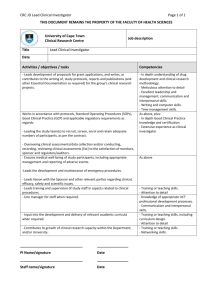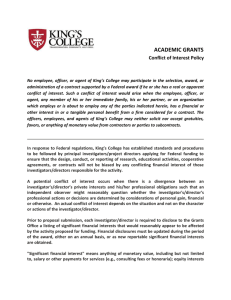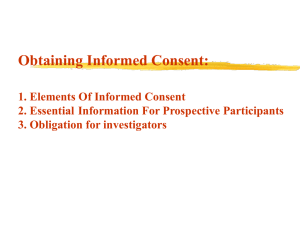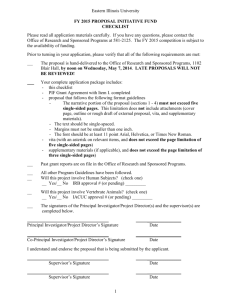UNA Conflict of Interest Policy
advertisement
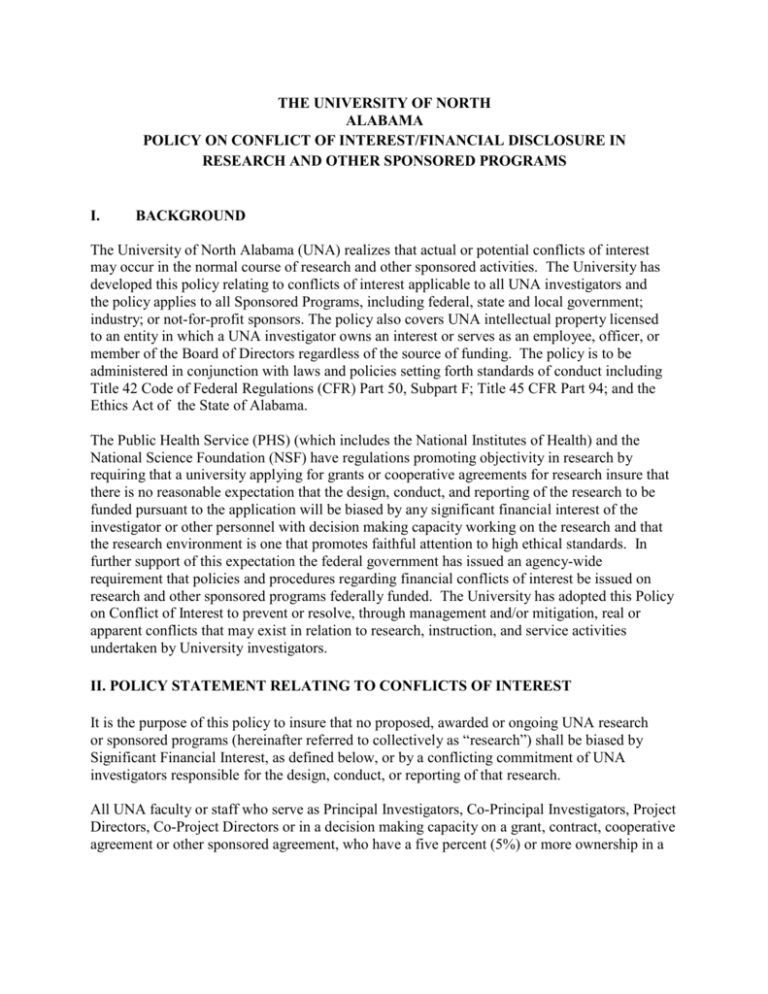
THE UNIVERSITY OF NORTH ALABAMA POLICY ON CONFLICT OF INTEREST/FINANCIAL DISCLOSURE IN RESEARCH AND OTHER SPONSORED PROGRAMS I. BACKGROUND The University of North Alabama (UNA) realizes that actual or potential conflicts of interest may occur in the normal course of research and other sponsored activities. The University has developed this policy relating to conflicts of interest applicable to all UNA investigators and the policy applies to all Sponsored Programs, including federal, state and local government; industry; or not-for-profit sponsors. The policy also covers UNA intellectual property licensed to an entity in which a UNA investigator owns an interest or serves as an employee, officer, or member of the Board of Directors regardless of the source of funding. The policy is to be administered in conjunction with laws and policies setting forth standards of conduct including Title 42 Code of Federal Regulations (CFR) Part 50, Subpart F; Title 45 CFR Part 94; and the Ethics Act of the State of Alabama. The Public Health Service (PHS) (which includes the National Institutes of Health) and the National Science Foundation (NSF) have regulations promoting objectivity in research by requiring that a university applying for grants or cooperative agreements for research insure that there is no reasonable expectation that the design, conduct, and reporting of the research to be funded pursuant to the application will be biased by any significant financial interest of the investigator or other personnel with decision making capacity working on the research and that the research environment is one that promotes faithful attention to high ethical standards. In further support of this expectation the federal government has issued an agency-wide requirement that policies and procedures regarding financial conflicts of interest be issued on research and other sponsored programs federally funded. The University has adopted this Policy on Conflict of Interest to prevent or resolve, through management and/or mitigation, real or apparent conflicts that may exist in relation to research, instruction, and service activities undertaken by University investigators. II. POLICY STATEMENT RELATING TO CONFLICTS OF INTEREST It is the purpose of this policy to insure that no proposed, awarded or ongoing UNA research or sponsored programs (hereinafter referred to collectively as “research”) shall be biased by Significant Financial Interest, as defined below, or by a conflicting commitment of UNA investigators responsible for the design, conduct, or reporting of that research. All UNA faculty or staff who serve as Principal Investigators, Co-Principal Investigators, Project Directors, Co-Project Directors or in a decision making capacity on a grant, contract, cooperative agreement or other sponsored agreement, who have a five percent (5%) or more ownership in a company or receive $10,000 or more income from the company will disclose that ownership to allow a review of potential conflicts of interest, conflicts of commitment, conflicts regarding employment and/or use of graduate students in the company. This policy also applies to any faculty, staff, student, fellow, trainee, or other individual who, under the aegis of UNA or pursuant to the review and approval of UNA’s Institutional Review Board for the Protection of Human Subjects (IRB), conducts research involving human subjects. Prior to seeking UNA approvals for submission of any research or sponsored project proposal or application, each investigator, as defined under definitions below, must have submitted to UNA’s Office of Sponsored Programs a financial disclosure statement certifying they have no conflict of interest or if they believe they have a conflict of interest listing all Significant Financial Interests of the investigator and the investigator’s immediate family, as defined under definitions below. Each such financial disclosure statement must be updated during the course of the award either on an annual basis, or as new reportable Significant Financial Interests are obtained. The Office of Sponsored Programs will maintain confidential records, identifiable by investigator, award and/or company, of all financial disclosures and all actions taken with respect to each Significant Financial Interest for at least three years beyond the termination or completion of the award, or until resolution of any action by a granting agency involving the records, whichever is longer. In the case of faculty or staff ownership of a company, all financial disclosures and all actions taken with respect to each Significant Financial Interest will be held for the life of the company. This policy establishes guidelines for the appropriate structuring of relationships with industry and other outside ventures to prevent conflict with previously established responsibilities to UNA. Investigators are expected to make reasonable inquiry as to whether their relationships and activities fall within the provisions of this policy. It is not the intent of this policy to eliminate or prohibit all situations involving potential conflicts of interest. Rather, the policy is intended to enable investigators to recognize situations that may pose a conflict of interest, to provide processes for reporting these situations to UNA’s Office of Sponsored Programs and for working with the Office of Sponsored Programs to manage these situations. This policy is intended to maintain the professional autonomy of researchers inherent in the self-regulation of research and scholarship. In the event that an investigator participates in research subject to this policy and the research is being simultaneously supported by an organization that has a commercial interest in the outcome of the research project, the research support by such organization must be provided through UNA. Any direct compensation or payment to the Investigator under that support must be disclosed, regardless of the amount. This policy will provide assurance to the investigators, UNA, and, most importantly, the public, that relationships with industry and for-profit entities have been examined and will be conducted in a manner consistent with UNA and public values. III. DEFINITIONS A. Immediate Family. Immediate family includes the investigator, his/her spouse, and dependent children. B. Investigator. Investigator means UA faculty or staff members who are principal investigators or project directors, co-principal investigators, or other persons at the university responsible for the design, conduct, or reporting of research, educational, or service activities funded, or proposed for funding, by an external sponsor. C. Research Compliance Officer (RCO) aka Director, Office of Sponsored Programs. The RCO will be the first point of contact for investigators on issues relating to conflict of interest and will perform the initial review of the Statement of Potential Conflict of Interest. The RCO will also coordinate the review of this statement with the University’s Institutional Review Board for the Protection of Human Subject. The RCO will process all paperwork related to conflict of interest disclosures and, if appropriate, conflict of interest management plans. The Research Compliance Officer is responsible for keeping the appropriate external funding agency informed if UNA finds it is unable to satisfactorily manage an actual or potential conflict of interest for any activity in which that agency requires that it be notified in such an instance. D. Sponsored Research. Sponsored Research means research, training and instructional projects involving funds, materials, or other compensation from external sources. E. Research. Research means a systematic investigation designed to develop or contribute to knowledge. F. Responsible University Official (RUO ). The Responsible University Official will be the Vice President for Academic Affairs. G. Significant Financial Interest. Significant Financial Interest means anything of monetary value or potential monetary value including, but not limited to, salary or other payments for services (e.g. consulting fees or honoraria), equity interests (e.g. stocks, stock options, or other ownership interests), and intellectual property rights (e.g. patents, copyrights, licensing agreements, and royalties from such rights). The term does not include any of the following: 1) An equity interest that, when aggregated for an investigator and the investigator’s immediate family, meets both the following tests: does not exceed $10,000 in value as determined through reference to public prices or other reasonable measures of fair market value, and does not represent more than a 5% ownership interest in any single entity. (NOTE: When the proposed project requires the use of human subjects and approval from the Institutional Review Board, these monetary thresholds do not apply. In such cases, the disclosure threshold is any amount above $0 and any equity percentage above 0%.) 2) Salary, royalties, or other payments that, when aggregated for an investigator and the investigator’s immediate family, are not expected to exceed $10,000 during the next twelve-month period. 3) Interest(s) held directly through funds such as mutual funds, pension funds, or other institutional investment funds in which the investigator or the investigator’s family does not control the selection of investments. 4) Salary or other remuneration received from UNA, including salary received from external sources through sponsored research agreements administered by UNA; 5) Standard royalties received for published scholarly work or other professional writings; 6) Income from seminars, lectures, or teaching engagements sponsored by public entities or non-profit entities; or 7) Income from services on advisory committees or review panels for governmental entities, public or non-profit entities. I. Use of Human Subjects in Research. Human Subject means a living individual about whom an Investigator conducting research obtains data through intervention or interaction with the individual or obtains data through identifiable private information. If a potential conflict of interest exists, and human subjects are involved in the research, the investigator will need to obtain the approval of UNA’s Institutional Review Board for the Protection of Human Subjects. CONFLICTS OF INTEREST A potential or actual conflict of interest exists when an investigator or an investigator’s immediate family has a significant financial interest, as defined above, in an outside funding source which interest could directly and significantly affect decision making in the design, conduct, or reporting of externally funded instruction, research, or service activities performed on behalf of the University. V. PROCEDURES A. All Investigators must certify to the University’s Research Compliance Officer (RCO) knowledge of and compliance with UNA’s policy for promoting objectivity in research by managing, reducing, or eliminating conflicts of interest as outlined herein (the Statement of Potential Conflict of Interest). This certification and disclosure form also requires similar information about members of the investigator’s immediate family. Statements must include detailed supplemental information if an investigator marks any “yes” box. B. Investigators must disclose to the RCO on an ad hoc basis new situations in which Significant Financial Interests are obtained and which may raise questions of conflicts of interest as soon as such situations develop. C. The Research Compliance Officer (RCO) will review the certification and disclosure statement to determine whether a potential for a conflict of interest exists. A potential conflict of interest exists when the RCO reasonably determines that a Significant Financial Interest could affect the design, conduct, or reporting of the research or educational activities in question. If it is determined that no conflict exists, the RCO will sign the statement, seek and obtain the signature of the Responsible University Official (RUO), and notify the Office for Sponsored Programs. If the RCO determines that there may be a potential for conflict of interest covered by this policy, the RCO will forward this determination along with the submitted materials to the RUO. D. Should the RUO agree that the situation represents potential for a conflict of interest, and recommend development of a conflict of interest management plan; the RCO shall work with the Investigator to develop the plan to manage, reduce, or eliminate the actual or potential conflict of interest. The plan will then be submitted to the RUO who then may recommend approval of the plan as developed or may recommend modification of the plan. E. Examples of conditions or restrictions that might be part of the plan to manage, reduce, or eliminate actual or potential conflicts of interest include: 1. 2. 3. 4. 5. 6. Public disclosure of Significant Financial Interests; Monitoring of the research by independent reviewers; Modification of the research plan; Disqualification from participation in all or a portion of the research project in question; Divestiture of Significant Financial Interests; and, Severance of relationships that create actual or potential conflicts. F. Once a plan approved by the RUO is developed, the Research Compliance Officer (RCO) will work with the investigator on the implementation and management of the plan. G. If the management recommendation involves divestiture of financial interests or severance of relationships that create actual or potential conflicts, the RUO will confer with the President. The President has the authority to require the divestiture of significant financial interests and/or the severance of relationships that create actual or potential conflicts. VI. Appeals Appeals of Recommendations made by RUO. Should an Investigator wish to appeal a decision made by the RUO, he/she may present the appeal to the Responsible University Official (RUO). The RUO will confer with the President. In such cases, the President shall review all of the materials relating to the action in question, shall discuss the findings/decisions with the investigator, RCO, and RUO. After review, the President shall make a final decision as to the action. All decisions of the President of an appeal under this policy are final. VII. INVESTIGATOR RESPONSIBILITIES A. Responsibilities of Investigators. UNA Investigators involved in research shall be responsible for: 1. Reading, understanding and following this policy; 2. Disclosing financial interests to the Research Compliance Officer by completing, signing, and submitting the Statement of Potential Conflict of Interest on or before a specified date or before submission of the grant/contract application; 3. Updating the statement with the Research Compliance Officer as changes occur, so that the statement on file is current and accurate at all times when an award is pending or in force; 4. To the extent possible, ensuring that funded research carried out through subgrantees, contractors, or collaborators complies with UNA’s Policy on Conflict of Interest or that these entities provide assurance of compliance with all federal regulations and state law; VIII. REPORTING A. For externally funded or sponsored activities, the University must report any conflicting interest to the funding source prior to expending any funds, and any interest identified as conflicting subsequent to the initial report must be reported within 60 days of that identification. Further, the University agrees to make conflict of interest information available, upon request, to any external funding source potentially or actually affected by this information. If it is determined that an investigator has biased externally funded or sponsored activities, the University will promptly notify the funding source of the corrective action taken or to be taken. In the case where a project to evaluate a drug, medical device or treatment, and or equipment was conducted by an investigator with a conflict that was not disclosed or managed, the University will require the investigator to disclose the conflict in each public presentation of the results of the research. IX. ENFORCEMENT A. UNA anticipates that its investigators will comply fully and in a timely manner with this policy. Instances of deliberate breach, including: (i) failure to submit required statements or updates thereof; (ii) failure to provide additional information requested by the Research Compliance Officer (RCO), or the RUO; (iii) knowingly filing an incomplete, erroneous, or misleading statement; (iv) knowingly violating applicable laws, UNA policies or procedures; (v) or failure to comply with prescribed conditions or restrictions that have been imposed pursuant to this policy, may subject the investigator to disciplinary action under UNA policies or procedures. Such action could result in a formal reprimand, non-renewal of appointment, termination of appointment for good cause, or any other enforcement action mandated by a granting agency. XI. Use of Human Subjects A. Use of Human Subjects. Any faculty, or staff, student, fellow, trainee, administrator, volunteer, or other individual who, under the aegis of UNA or pursuant to the review and approval of UNA’s Institutional Review Board for the Protection of Human Subjects (IRB), conducts research involving human subjects must complete and submit a statement for review by the Research Compliance Officer (RCO). The statement must be updated as circumstances of the Investigator or his/her spouse or dependent children change.
